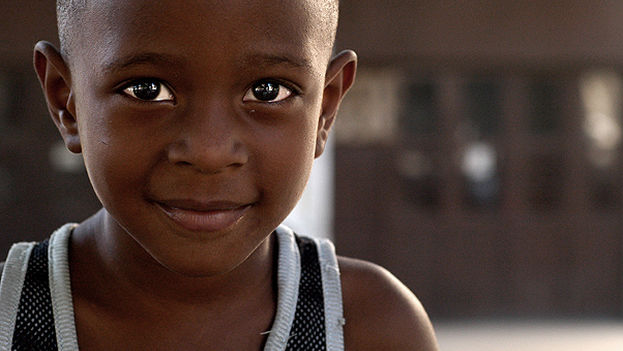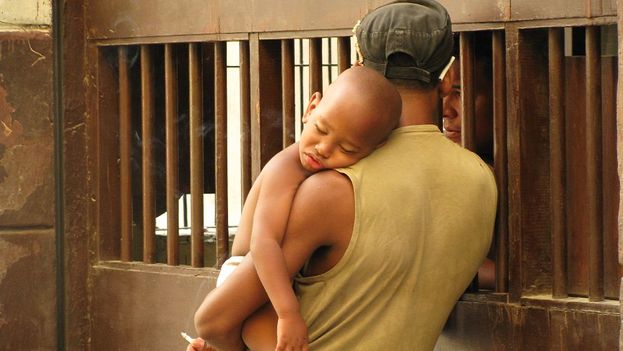Note: Our apologies that this video is not subtitled, but hopefully the images will be of interest to all.
![]() 14ymedio, Zunilda Mata, Havana, 26 August 2017 – She walks slowly constantly fanning herself. With each step her full-skirted flowery dress swishes from side to side. Yadira Ramos is 34 and will give birth for the first time in just two weeks. With a degree in accounting, the young woman postponed maternity for professional reasons, but the decision to have only one child was made for economic reasons.
14ymedio, Zunilda Mata, Havana, 26 August 2017 – She walks slowly constantly fanning herself. With each step her full-skirted flowery dress swishes from side to side. Yadira Ramos is 34 and will give birth for the first time in just two weeks. With a degree in accounting, the young woman postponed maternity for professional reasons, but the decision to have only one child was made for economic reasons.
For almost forty years Cuba’s fertility rate has failed to rise. In 2016, the average number of children per woman was only 1.63, with 8,192 fewer children born than in the previous year, according to the Statistical Yearbook of Health. The island’s difficult demographic situation threatens to become the most serious of its problems.
Authorities are alarmed by the low birth rate, which leads to an accelerated process of population decline. Aging increases the cost of pensions and healthcare in a country that ended 2016 in an economic recession.
Cubans are living longer and longer and life expectancy I now close to 79.5 years, while the period couples dedicate to reproduction is shorter, as it conflicts with the time that women can spend on their careers.

When she was little, Yadira Ramos called her dolls with the names she dreamed of for her future daughters: “Lucrecia, Lucia and Amanda.” However, the plans for a large family collided with reality. “The situation is such that there is not enough to have more than one child,” the pregnant woman explains to 14ymedio.
Married to a waiter working in a state-owned restaurant, the future mother belongs to a social stratum that lives day-to-day, without being able to afford luxuries. Most of her last year’s salary has been used for the purchase of diapers, bottles and a cradle. “The budget doesn’t stretch and without the gifts people have given me I do not know how I would manage,” she says.
Like many other Cubans, Ramos preferred to postpone motherhood until she had a “more solid” job position. She says that “after a woman gives birth, it becomes very difficult for her to assume management responsibilities at work because she has to take on more tasks at home.”
Like many other Cubans, Ramos preferred to postpone motherhood until she had a “more solid” job position
In February of this year, the Government launched new provisions to encourage births, such as the paying other family members for the care of minors and tax cuts for women workers in the private sector who have two or more children. However, the measures are far from solving a problem that goes beyond the low salaries and the insufficient payments for maternity leave.
The search for the causes of the decline in births has become a point of friction. Official voices point to the freedoms enjoyed by women as the reason they delay pregnancy and have fewer children. While on the street, comments from ordinary people point to the economy and housing problems.
Women serve as heads of household in 45% of families and hold 66% of technical jobs, but the distribution of domestic work remains inequitable. Machismo still determines that women are responsible for most of the care of a newborn.

This disproportion of tasks discourages many women from becoming mothers. “I have not yet found a man who can serve as the father of my children,” said Tania, 24, a nursing assistant at a polyclinic in Havana’s Plaza of the Revolution municipality. “It’s a decision that needs to be taken very seriously.”
Tania has had six abortions so far. “I do not have the circumstances to have a child and I will not bring one into the world to work,” she says. She feels that “many pregnancies end in interruption because the family can not assume the expenses of a baby.”
In 2016, 85,445 induced abortions were carried out in Cuba, according to data from the Statistical Yearbook of Health, while only 116,725 children were born.
In 2016, 85,445 induced abortions were carried out in Cuba, according to data from the Statistical Yearbook of Health, while only 116,725 children were born
In Tania’s case, the search for the appropriate father is joined by an old dream of emigration. “With a child it becomes much more difficult to get a visa for anywhere and it is very difficult to start from scratch in another country,” the nurse said. Emigration is another of the many reasons that fertility is plunging on the island.
According to Juan Carlos Alfonso Fraga, Director and Researcher for the Center for Population and Development Studies of the National Office of Statistics and Information, the decline in the birth rate is associated with advances in “the conditions of the family and of women” along with “policies for the exercise of sexual and reproductive rights.”
However, the specialist acknowledges that “unresolved, material problems associated with housing shortages, lack of goods” and “high prices” also contribute to reducing the number of births.
Despite the fall in the number of births, Cuban women continue to receive strong social pressure to be mothers
Despite the fall in the number of births, Cuban women continue to receive strong social pressure to be mothers. In the collective imagination, motherhood is the “consecration” of women and those who postpone the arrival of a child are criticized by friends and family.
The poet and writer Irela Casaña reflects on these social pressures and says that she is often asked why she has not had a baby. “Who’s going to take care of you when you’re old?” a friend asked her recently. The writer laments that this means “now children are an investment, a natural loan and with high interest rates.”
Yadira Ramos has already chosen a name for the baby she expects in a few weeks. “She will be called Amanda, like one of my childhood dolls,” she says.
______________________
Editor’s Note: This report was made with the support of the Howard G Buffet Fund for Women Journalists from the International Women’s Media Foundation.
